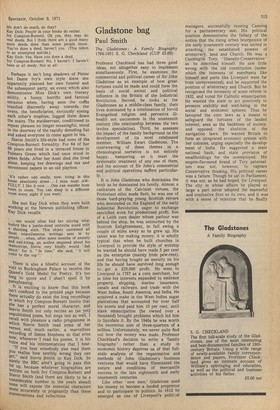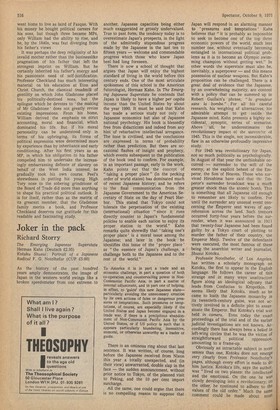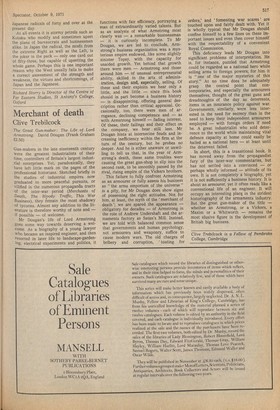Gladstone bag
Paul Smith
The Gladstones: A Family Biography 1764-1851 S. G. Checkland (CUP £5.00)
Professor Checkland has had three good ideas, not altogether easy to implement simultaneously. First, he examines the commercial and political career of Sir John Gladstone as an example of how great fortunes could be made and could form the basis of social ascent and political influence in the Britain of the Industrial Revolution. Second, he looks at the Gladstones as a middle-class family, their lives dominated by a combination of fervid Evangelical religion and pervasive illhealth not uncommon in the nineteenth century (the relationship between the two invites speculation). Third, he assesses the impact of the family background on the development of its most celebrated member, William Ewart Gladstone. The interweaving of these themes in a chronological narrative is not entirely happy, hampering as it must the systematic treatment of any one of them, and the account of Sir John's commercial and political operations suffers particularly.
It is John Gladstone who dominates the book as he dominated his family. Almost a caricature of the Calvinist virtues, the Protestant ethic made flesh, he was one of those hard-praying young Scottish reivers who descended on the England of the early Industrial Revolution, eager to exchange sanctified work for predestined profit. Son of a Leith corn dealer whose parlour was behind the shop, he was untouched by the Scottish Enlightenment, in full swing a couple of miles away as he grew up. His talent was for making money: it is wholly typical that when he built churches in Liverpool to provide the style of worship he wanted he should have made 5 per cent on the enterprise (mainly from pew-rent), and that having bought an annuity on his life he should have survived long enough to get a £25,000 profit. He went to Liverpool in 1787 as a corn merchant, but in time his interests expanded to embrace property, shipping, marine insurance, canals and railways, and trade with the West Indies, South America, and India. He acquired a stake in the West Indies sugar plantations that accounted for over half his assets and paid him 10 per cent, until slave emancipation (he owned over a thousand) brought problems which led him to liquidate it. By the 1840s he was worth the enormous sum of three-quarters of a million. Unfortunately, we never quite find out how the money was made. Professor Checkland's decision to write a 'family biography' rather than a study in economic history deprives us of that fullscale analysis of the organization and methods of John Gladstone's business ventures that would have illuminated the nature and conditions of mercantile success in the late eighteenth and early nineteenth centuries.
Like other 'new men,' Gladstone used his money to become a landed proprietor and to participate in politics. In 1812 he emerged as one of Liverpool's political managers, successfully running Canning for a parliamentary seat. His political position demonstrates the fallacy of the notion that the rising urban bourgeoisie of the early nineteenth century was united in attacking the established powers of aristocracy, land and Church. He was a Canningite Tory, ' liberally-Conservative ' as he described himself. He saw little wrong with the old constitution (under which the interests of merchants like himself and ports like Liverpool were far from unrepresented), and he supported the position of aristocracy and Church. But he recognised the necessity of some reform in 1832, and voted for Catholic emancipation. He wanted the state to act positively to promote stability and well-being in the social and economic spheres. Thus he favoured the corn laws as a means to safeguard the fortunes of the landed interest, seen as the backbone of society, and opposed the abolition of the navigation laws. He wanted Britain to form an integrated economic system with her colonies, urging especially the development of India. He suggested a state national bank, and state provision of smallholdings for the unemployed. His empire-flavoured brand of Tory paternalism was not, however, to capture Conservative thinking. His political career was a failure. Though he sat in Parliament, it was not, as he had hoped, for Liverpool. The city in whose affairs he played so large a part never adopted the masterful and combative Scot as its own, and it was with a sense of rejection that he finally went home to live as laird of Fasque. With his money he bought political careers for his sons, but though three became MPs, only William had the ability to rise, and he, by the 1840s, was fast diverging from his father's views
It was perhaps the deep religiosity of his invalid mother rather than the businesslike pragmatism of his father that left the strongest imprint on William. But he certainly inherited his father's energy and his passionate need of self-justification. Professor Checkland has much interesting material on his education at Eton and Christ Church, the classical treadmill of gentility on which John Gladstone placed his politically-destined sons, but the epilogue which he devotes to the making of Mr Gladstone' does not greatly revise existing impressions. From his home, William derived the emphasis on strict accounting, moral and financial, which dominated his life. But if his moral personality can be understood only in terms of his upbringing, its forms of political expression were determined more by experience than by inheritance and early conditioning. After his first years as an MP, in which his obligation to his father compelled him to undertake the increasingly embarrassing defence of slavery on behalf of the West India interest, he gradually took his own course. Peel's shrewdness in putting his young High Tory nose to the sobering grindstone of the Board of Trade did more than anything to shape his practical political outlook. It is for itself, rather than as the matrix of its greatest member, that the Gladstone family merits a book, and Professor Checkland deserves our gratitude for this readable and fascinating study.
another, Japanese capacities being either much exaggerated or grossly undervalued. True to past form, the tendency today is to overestimate Japan's prospects, in the light of the admittedly stupendous progress made by the Japanese in the last ten to fifteen years — welcome and commendable progress which those who knew Japan best had long foreseen.
There is now a school of thought that argues that Japan will enjoy the highest standard of living in the world before this century ends. One of the most articulate spokesmen of this school is the American futurologist, Herman Kahn. In The Emerging Japanese Superstate he contends that Japan is likely to have a higher per capita income than the United States by about the year 1990. It must be said that Kahn has made a serious study not only of Japanese economics but also of Japanese national psychology. His book is blessedly free from didacticism and indeed from any hint of rebarbative intellectual arrogance. The tone is civilised, and the conclusions are expressed in terms of probability rather than prediction. But there are occasional flashes of insight and prophecy, which events subsequent to the publication of the book tend to confirm. For example, in an important passage, early in the work, Kahn points out that the concept of "taking a proper place" (in the pecking order of world states) has dominated much of recent Japanese history; and he refers to the final communication from the Japanese Government to the American Secretary of State on the day of Pearl Harbor. This stated that Tokyo could not tolerate the perpetuation of the existing (international) situation " since it runs directly counter to Japan's fundamental policies to enable each nation to enjoy its proper station in the world." Kahn remarks quite shrewdly that 'taking one's proper place' is a moral issue among the Japanese; and later in the book he identifies this issue of the 'proper place' as "the essence of Japan's challenge, a challenge both to the Japanese and to the rest of the world."
To America it is in part a trade and an economic challenge, in part a question of both co-operation and countervailing power in NonCommunist Pacific Asia, in part a matter of internal adjustment, and in part one of helping, in effect, to 'guide' this new Japanese state— particularly avoiding the unnecessary creation by its own actions of false or dangerous pressures or temptations. Such pressures or temptations, of course, are especially likely if the United States and Japan become engaged in a trade war, if there is a precipitous abandonment of Non-Communist Pacific Asia by the United States, or if US policy is such that it appears particularly blundering, insensitive, immoral, or otherwise unworthy as a leader or guide.
There is an ominous ring about that last sentence. It was written, of course, long before the Japanese received from Nixon this year a totally unexpected, and (in their view) unwarranted, double slap in the face — the sudden announcement, without prior notice to Tokyo, of the planned visit to Peking, and the 10 per cent import surcharge.
All the same, one could argue that there is no compelling reason to suppose that
Japan will respond in an alarming manner to 'pressures and temptations' Kahn believes that "it is probably as impossible to seek to become one of the top three economic powers of the world, much less number one, without eventually becoming entangled in international political problems as it is to become an Olympic swimming champion without getting wet." In other words the superstate must also be, inevitably, a superpower — and this means possession of nuclear weapons. But Kahn's proposition can be challenged. There is a great deal of evidence that the Japanese, by an overwhelming majority, are content with a policy that can be summed up in Robert Guillain's phrase, " la grandeur sans la bombe." , For all his careful research, his weighing of alternatives, his admirable attempt to get inside the Japanese mind, Kahn presents a highly occidental, synoptic, series of scenarios. Above all, he underestimates the revolutionary impact of the surretyler of 1945. This is the single, not inconsiderable, flaw in an otherwise profoundly impressive study.
For 1945 was revolutionary for Japan, not so much politically as psychologically. In August of that year the unthinkable occurred — surrender to the will of the enemy, at the explicit behest of the Emperor, the Son of Heaven. Those who survived Hiroshima have said that thc Emperor's surrender broadcast was a much greater shock than the atomic bomb. This is something that all Japanese old enough to remember are likely to confirm. For until the surrender any unusual event concerning the Emperor sent waves of apprehension across the land. Such tremors occurred forty-four years before the surrender, when it was announced in 1911 that twenty-four Japanese had been found guilty by a Tokyo court of plotting to murder the father of their country, the Emperor Meiji. Twelve of the defendants were executed, the most famous of these being the anarchist writer and journalist, Shusui Kotoku.
Professor Notelhefer, of Los Angeles, has written a scholarly monograph on Kotoku, the first to appear in the English language. He follows the career of this strange and in many ways unattractive figure along an ideological odyssey that leads from Confucius to Kropotkin. It seems likely that Kotoku, much as he came to loath the Japanese monarchy in its twentieth-century guise, was not actively involved in a definite plot to assassinate the Emperor. But Kotoku's trial was
held in camera. Even today the exact proceedings of the trial and of the earlier judicial investigations are not known. Ac. cordingly there has always been a belief in left-wing circles that he was the victim of straightforward political oppression, amounting to a frame-up.
Obviously an intractable subject in more senses than one, Kotoku does not emerge very clearly from Professor Notelhefer's pages, although every effort is made to do him justice. Kotoku's life, says the author,
was "lived on two planes: the intellectual
and the emotional. On the one he was slowly developing into a revolutionary; 00 the other, he continued to adhere to the values of the old order." Much the sane comment could be made about most
Japanese radicals of forty and over at the present day.
At all events it is stormy petrels such as Kotoku who modify and sometimes upset the plans of bureaucrats and businessmen alike. In Japan the radical, the misfit from the extreme Right as well as the Left, is the joker in the pack — only one card out of fifty-three, but capable of upsetting the whole game. Perhaps this is one important reason why the West usually fails to make a correct assessment of the strength and weakness, the virtues and shortcomings, of Japan and the Japanese.
Richard Storry is Director of the Centre of Far Eastern Studies, St Antony's College, Oxford












































 Previous page
Previous page